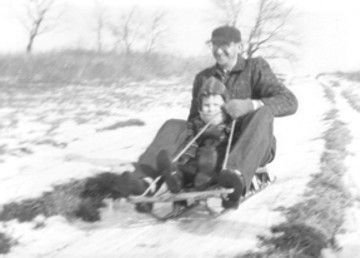Here’s a little bit of fame in the family tree. My maternal Grandfather’s name was Harry Branch Rickey. He was a cousin of Branch Rickey,the innovative baseball manager who broke the color barrier by hiring Jackie Robinson.
GrandDad Rickey was a man of few words. He loved baseball. He loved the Cardinals. One vivid memory: He, sitting on the end of the couch watching a black & white screen under rabbit-ears flagged with foil. The Cardinals were on. Now and then, he’d lean over the arm of the couch and spit a stream of tobacco juice into a gallon-size milk carton sitting on the floor at his side. He loved Red Man, too. Once in a while, he’d look in the general direction of the kitchen and holler, “Coffee!” GrandMother Rickey would bring him a cup of instant.
I remember Sunday afternoons, when I was little, a group of us would go to the nearby schoolyard of North Park Elementary in Rockford to field the fly balls GrandDad Rickey would knock, batting left-handed, to the far-reaches of the field. From out in the field, he seemed acres away. I watched him, tiny, toss the ball up and swing, the crack of the bat on the ball coming to my ears time-delayed, a fraction of a second later.
He worked second shift at Greenlee’s in Rockford, Illinois. I don’t know the circumstances of the move, but he’d brought his family to Rockford in the early Sixties. He owned forty acres someone else farmed on the outskirts of O’Kean, Arkansas. There, there was a four-room house with no indoor plumbing. Years earlier, when visiting, I remember holding my poops until I could finally hold them no more before making the trek to the outhouse, risking snakes, risking spiders, risking every fearful thing I feared. Once inside, it wasn’t so frightening. I found a certain comfort in the enclosure of weathered wood. Perhaps in my relief, I was nearly delirious.
The last car he owned, a black 1965 Buick Wildcat, had an enormous engine. On a four-lane, when GrandDad was driving, if anyone tried to pass him, he would say, “Cain’t nobody pass this Wildcat.” He’d floor it and off we’d go, leaving the trespasser bouncing around in the jet-fueled backwash of the V-8. (Later, when we got our driver’s licenses, my Uncle Clifton (five months my senior) and my brother and I would take the Wildcat and “run the wheels off it” or “burn up gas,” as GrandMother called it, on the country roads around O’Kean.)
I believe he had been devastated by the loss of one of his sons, Leon–third youngest–when Leon’s car, at high-speed, wrapped itself around a telephone pole, in the early Sixties, killing Leon and his wife in the wee-hours of the morning. They left two small children, Cindy who was later adopted by her maternal grandparents, and my cousin Terry, two-years-old or so at the time, later adopted by GrandMother and GrandDad. It was about this time GranDad took to weeping at odd moments. One particular time, he looked me full in the face. He smiled and started laughing silently, then he gasped as his head dropped, his shoulders bobbed up and down as quiet sobs took him over. Shortly after, they moved back to O’Kean. Built a small two-bedroom ranch with plumbing. Tore down the old house.
He was diagnosed with–memory fails me here–Hodgkins disease? Lou Gehrig’s disease? The irony of his love of baseball, and this near statement, now, not lost on me. He began a relatively long period of failing. Near the end, Mom and my brother and sister and I drove to Arkansas over Christmas school break, so Mom could help Grandmother care for him for a little while. I had my learner’s permit, so I could help drive the ten-hour trip. Dad had to stay home and work. By that time, GrandDad had to be fed through a tube the doctors installed through his side to his stomach. GrandMother and Mom would fix supper, then whirl it up in a blender to put in a large syringe and pump into his stomach through the tube.
We were there about two weeks. If memory serves, Christmas day that year, temperature-wise, was something in the mid-seventies. I remember kicking a can that day, across some dry, scrubby ground. I was wearing shorts (For someone who’d lived his life in Rockford, Illinois, such warm weather that time of year was unheard of.) I remember thinking how unreal all of it was.
I’m a little ashamed I don’t remember the exact date of GrandDad’s death. Or the year for that matter. It was sometime early in the following Spring. It had to be about 1971 or 1972. Nor do I remember his age. It had to be around about the age I am now.
Harry Branch Rickey, preceded in death by one son, Leon. Followed in death by another son, Lowery, drowned, just a few years later, in flood-swollen waters, fetching a boat that got away from its mooring on a fishing trip in the bottoms of a nearby river. Followed, some many years later, by my GrandMother, Hazel Martin-Rickey, from the failure of her heart.
